What are the benefits of raspberry leaves and are there any restrictions on use?
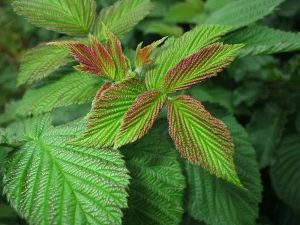
Raspberry is a well-known perennial plant with unique properties. In order to grow such a shrub, you do not need to put in a lot of effort. Raspberries have a great taste and a lot of vitamins. Various preparations for the winter are obtained from its berries. As a rule, this plant is valued because of its fruits, but not many people know that the leaves are also rich in many useful substances.
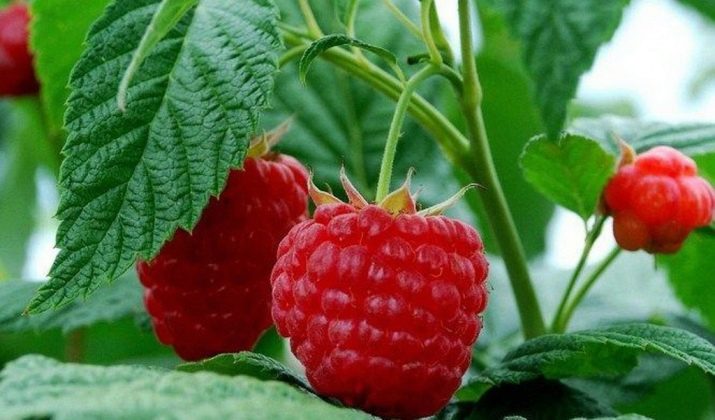
Composition and medicinal properties
The health benefits of dried raspberry leaves primarily lie in the fact that they are rich in various beneficial substances. The chemical composition of this plant is very diverse and includes various macro and micro elements, vitamins A and C, astringent tannins, as well as acids and antioxidants.
Teas and infusions made from raspberries and its leaves are used not only for preventive purposes, but also for the treatment of various ailments. In addition, the leaves of this plant contain a large amount of salicylic acid, which helps to relieve pain, stimulates sweating in diseases accompanied by high fever.Decoctions increase immunity, have antimicrobial and anti-inflammatory properties, which is especially helpful for infectious diseases of the ENT organs, as well as for viral infections.
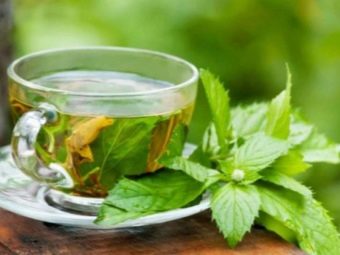
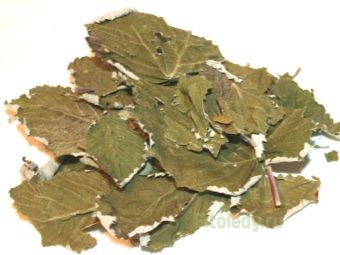
The presence in the composition of substances such as flavonoids allows the use of raspberry leaves in the treatment of diseases associated with capillary pathologies, in particular internal bleeding. Tanning properties indicate the feasibility of using drugs, which contain raspberry leaves, in the treatment of diseases and disorders of the gastrointestinal tract.
Fresh leaves are often used to treat facial inflammation, acne, and acne. Very popular are gargling with a decoction of raspberries for sore throats. Compresses can be applied for bruises and hemorrhoids. Also, all kinds of drinks based on this plant are indicated for many gynecological diseases.
Doctors recognize the usefulness and popularity of this plant, so it is included in some medicines. It should be noted that raspberries have gained wide use and considerable popularity due to their availability, as well as due to folk methods of treatment.
Raspberry leaves are widely used in the fight against many diseases, as they have good healing properties and at the same time have very few contraindications.


What diseases are treated?
The use of raspberry leaves is useful in the overall health of the human body. Due to its biochemical composition, the leaves are also used to eliminate various ailments and prevent them, but, as a rule, in folk medicine.
Despite this, raspberry leaves and its decoctions are used:
- for the treatment of sore throats, colds, flu, bronchitis;
- for quick washing of wounds;
- to neutralize poisonous bites of insects and animals;
- for the treatment of inflammation of the digestive tract, gastritis, diarrhea;
- with gynecological diseases;


- to increase immunity;
- if there are symptoms of stomatitis in children and adults;
- at risk of atherosclerosis;
- with heart disease (arrhythmia);
- to relieve the symptoms of conjunctivitis;
- to prevent depression and stress.
Raspberry leaves also have a diaphoretic, strengthening, medicinal effect.


Contraindications
Raspberry leaves, in addition to useful properties, have a whole list of contraindications. Drinks based on raspberry leaves can harm people with a disease such as gout. Also, despite the fact that raspberries help with diarrhea, they should not be used for chronic diarrhea and constipation. It is dangerous to take aspirin together with decoctions of raspberry leaves, as they have a similar chemical composition, therefore an overdose can cause side effects in the form of bleeding or a severe allergic reaction.
In addition, this remedy is not recommended for use during pregnancy at certain times: it can provoke premature birth. Only after the eighth month is it allowed to use this decoction.

How to take: recipes and tips
Decoctions of raspberry leaves increase the iron content in the blood, so this remedy is recommended to drink to prevent iron deficiency anemia in pregnant women. This tea can also be brewed for colds, as it helps to eliminate the feeling of fatigue, and also helps to increase the body's resistance to various infectious diseases. Next, we describe in detail the cases of who, when and how to take decoctions and infusions from raspberry leaves.

Pregnant
Raspberry leaves are very good to use during pregnancy, as they contain estrogens - hormones of natural origin, which help regulate the muscular activity of the uterus, and also help to greatly facilitate childbirth and prevent various pains and inflammation. Drinking a decoction is not allowed for the entire period of pregnancy, but only after the eighth month. As a rule, this contributes to the prevention of weak labor and prepares the woman for childbirth, softening the tissues of the birth canal, and also favors the rapid opening of the cervix.
Brew should be 2 tablespoons of crushed dry leaves per 1 liter of water. This decoction can be drunk instead of tea. To make the drink even more useful, add one dried raspberry leaf, one currant leaf and one willow leaf. In order for the taste to be pleasant, you can also add mint, hibiscus, rosehip, alfalfa, nettle, linden to the tea.
Traditional medicine advises to brew a decoction of the leaves for women's diseases, for menstrual disorders, to strengthen the gums, to purify the blood. Since raspberry leaves have an astringent effect, it is better to stop using them for chronic constipation.
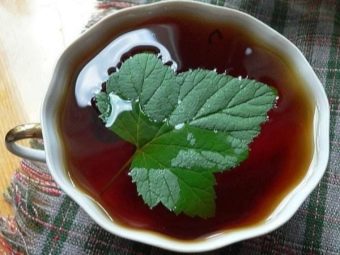

Before childbirth and during HB
It is believed that a decoction of raspberry leaves prepares the birth canal for childbirth. But, as practice shows, it all depends on the state of tea and on the amount of liquid you drink per day. Cold decoction increases elasticity, the ability to stretch, softening the cervix. The adoption of such a decoction contributes to better disclosure during childbirth and protects against various gaps. A warm drink helps stimulate labor.
If during pregnancy a woman unknowingly begins to drink a hot decoction, then during childbirth she will have an unopened cervix, but strong contractions will be observed, which can negatively affect the course of childbirth. As mentioned above, raspberry leaf tea should not be drunk before the eighth month of pregnancy. The drink should be drunk according to the following plan:
- 35 weeks - 300 ml of warm infusion per day;
- 36 weeks - 300 ml of chilled infusion per day;
- 37 weeks - 600 ml of warm infusion per day;
- 38 weeks - 900 ml of warm infusion per day;
- 39-40 weeks - 900 ml of hot tea per day.

In order to prepare a drink, take 30 g of leaves, put them in a thermos, pour a cup of hot water and leave for half an hour. Before use, strain the resulting infusion well.
Abroad, in preparation courses for childbirth, girls are advised to drink a decoction of the leaves 2 months before childbirth to increase tissue elasticity and facilitate childbirth, and also after childbirth to stimulate lactation.
An infusion of leaves is recommended for women who have not had their cervix open for a long time in past births, as well as for those who have viral diseases (rubella, herpes).
In addition, raspberry leaves significantly reduce pain during and after childbirth, have an impact on the postpartum recovery of the uterus.
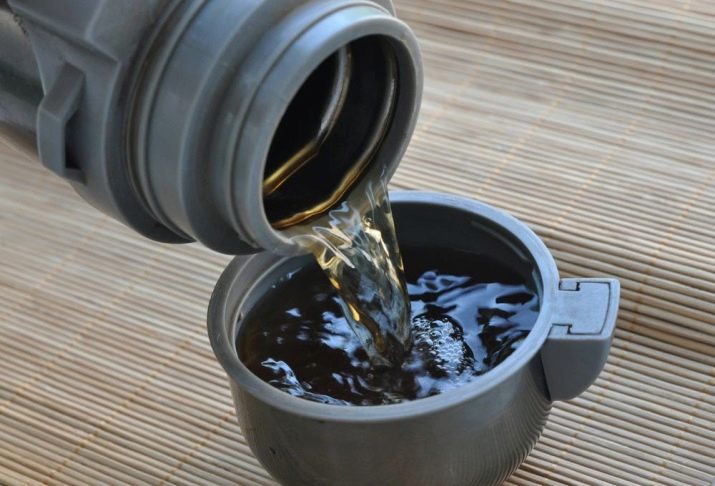
With SARS and cough
Collected in the summer, raspberry leaves are most often used as a decoction or infusion for colds, as they have a pronounced anti-inflammatory effect. Therefore, they are most often used to treat the throat and bronchi: as a rinse for sore throat and pharyngitis, as a means for coughing up sputum, and for bronchial asthma.
In order to prepare the infusion, you need to pour 1 tablespoon of raspberry leaves into a glass of hot water. Infuse all this for 20 minutes, then strain. Drink the resulting infusion should be throughout the day, dividing by 4 times.
To prepare a decoction, 1 tablespoon of dry raspberry leaves should be poured with 1 glass of water at room temperature, boiled for 10 minutes and filtered to drink throughout the day.
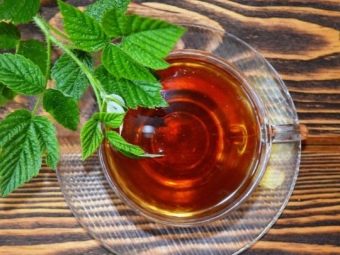

In addition to the above recipes, a decoction made from raspberry flowers will help to lower the temperature, relieve cough and eliminate intoxication of the body. For 1 cup of hot water, take 2 teaspoons of dried raspberry flowers. After insisting it for a quarter of an hour, add a little honey or lemon to the resulting broth. Drink before cooling.
No less effective in the treatment of colds and coughs is warm milk along with raspberries. Those who do not consume dairy products can dilute the jam with warm linden tea.
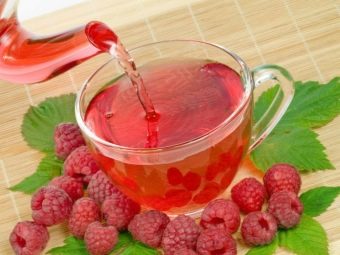
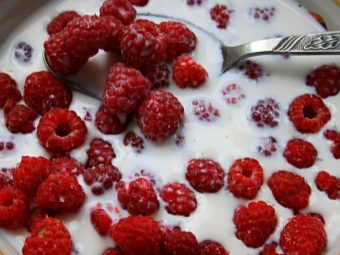
In other cases
With sore throat, 5-6 tablespoons of leaves are brewed with 1 liter of hot water and left to infuse for 4 hours. Strain and drink 2 cups several times a day. This infusion can be used for stomatitis, instilled into the eyes with conjunctivitis and make lotions and douches for various diseases.
To facilitate childbirth, you can prepare tea for women in the last month of pregnancy. To prepare this drink, pour a spoonful of leaves with boiling water and set aside to infuse for half an hour. Then strain and drink warm.
For scabies, swelling and redness at insect bites, take 4 tablespoons of the leaves. Next, fill them with alcohol and store in a dark place for 20 days. Then strain and make compresses on the bites.
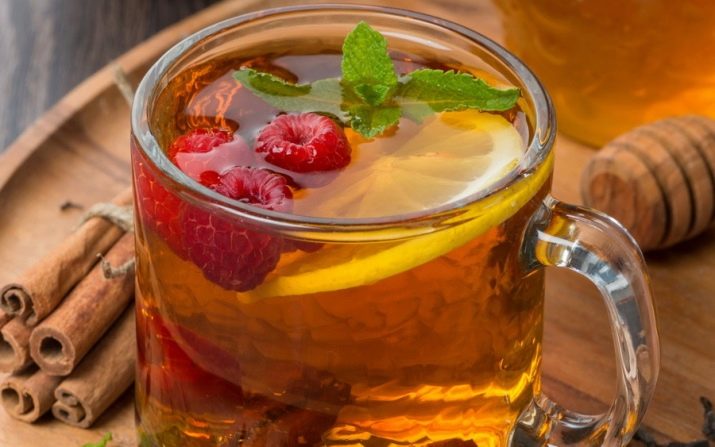
For acne, acne and inflammation on the skin, prepare fresh leaves: rinse, dry and grind in a mortar or blender. After that, mix the resulting mixture with petroleum jelly or ghee in equal proportions. Another method of making a cream: mix the juice obtained from fresh leaves with petroleum jelly or baby cream. Take 4 parts of ointment for 1 part of juice. The composition must be smeared directly on the inflamed areas of the skin.
For the treatment of herpes, a mixture of mashed young branches and leaves should be applied to the affected areas.
To reduce the temperature, 2 tablespoons of dry branches and leaves should be poured with a glass of hot water and insisted for 3 hours. Strain and drink half a glass every 3 hours. This infusion is also drunk for gastritis, colds and to increase lactation during breastfeeding.
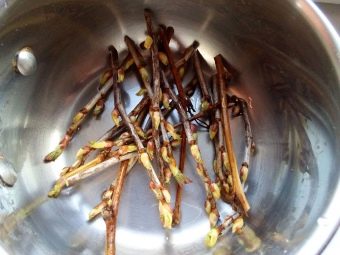

For gastric, uterine and other bleeding, pour 3 tablespoons of dry grass with hot water, leave for 20 minutes and drink half a glass 4 times a day.
For diseases of the genital organs and candidiasis, take 3 tablespoons of leaves and cook over medium heat for 10 minutes, then insist for an hour. Apply for douching.
For infertility, mix raspberry leaves and clover leaves in equal proportions. Then brew 1 teaspoon of herbs in 300 ml of boiling water, leave for 10 minutes and drink instead of tea every day for 90 days. After a 14-day break, if necessary, you can repeat the course of treatment.
When ovarian function declines, mix 3 tablespoons of raspberry leaves with 1 tablespoon of currant leaves, pour 500 ml of boiling water and leave for 15 minutes. Drink half a glass 3 times a day.
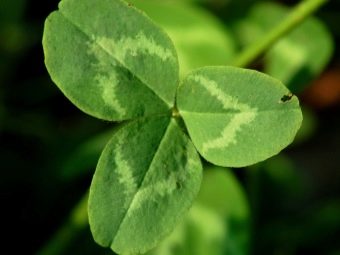
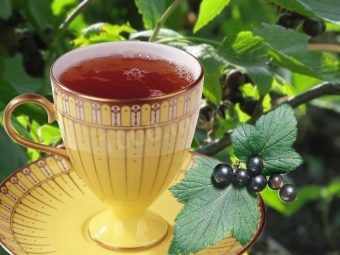
With bronchial asthma, tea should be made from the collection (in equal parts) of raspberry leaves and herbs such as coltsfoot and oregano.For a glass of boiling water, you need to take 1 tablespoon of the collection. Drink very warm, you can add honey.
For renal colic, collect 20 g of dry raspberry leaves, 100 g of birch leaves, 10 g of cuff leaves and dry marshwort each, brew with 5 liters of hot water, leave for at least an hour, strain and pour into a bath with warm water.
With heavy menstruation, make a collection that includes raspberry, strawberry, yarrow and oak bark leaves: pour 1 tablespoon into 200 ml of hot water and leave for 5-6 hours, and then bring to a boil again and cook for 20 minutes. Consume chilled at 300 ml per day for 7 days.
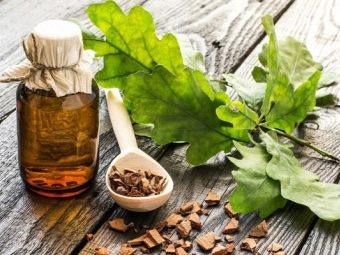

Preparation: where, when, how?
Before you start harvesting medicinal material, you need to have information about some features of the assembly of leaves, their harvesting and storage. As a rule, they begin to collect leaves in late spring, when the plant begins its flowering period. Pay attention to the color and condition of the leaves: they should not be dry or affected by any diseases.
The time for collection is also the main condition. It could be late morning or evening. This is because the leaves must be dry and uncovered by morning dew. Next, you have to dry the young leaves that were collected. It is believed that the leaves should be dried in the sun, but this is a big mistake. Leaves should be dried in a well-ventilated and dry place out of direct sunlight so that they can retain all their beneficial properties.
Also, the leaves can be dried in the fresh air under awnings, spreading them evenly in one layer on any fabric. In order for the stored raw materials to dry completely, it must be periodically stirred and mixed.
By following all the above recommendations, you can stock up on leaves of this useful plant for 1-2 years in advance.
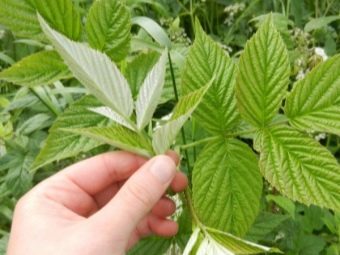
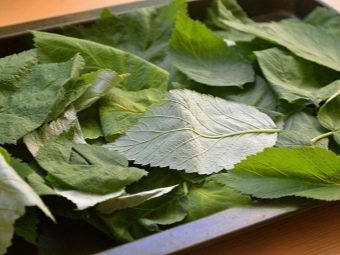
We talked in detail about the properties of raspberry leaves, as well as their health benefits and harms. Thus, you should pay attention to this plant and introduce drinks based on it into your menu. However, it is necessary to know that these drugs are not a panacea, as they belong to traditional medicine. The actions of these funds are just the result of long-term observations of the common people, so a conversation with a competent doctor is absolutely necessary before starting the application.

For information on how to make tea from raspberry leaves, see the following video.

















